Daily Vocabulary Words: Enhance Your Lexicon with Leading Newspapers & Publications
Welcome to the Daily Vocabulary section at Wordpandit!
Our mission is straightforward: to bring you essential vocabulary words featured in top newspapers and publications worldwide. By focusing on words you’ll encounter in renowned sources, we aim to help you enhance your vocabulary effectively and practically.
Our selection includes words from:
– The New York Times
– The Washington Post
– Scientific American
– BBC
– The Guardian
– Psychology Today
– Wall Street Journal
– The Economist
– The Hindu
– The Times of India
– The Economic Times
– Hindustan Times
– Live Mint
– The Indian Express
– And many more.
We are committed to your vocabulary development. Simply visit this section regularly and explore the daily posts. This is your go-to repository for commonly used words, providing significant practical benefits by familiarizing you with vocabulary from the leading publications listed above.
Make it a habit to visit our website daily and expand your lexicon with words from top newspapers and publications.
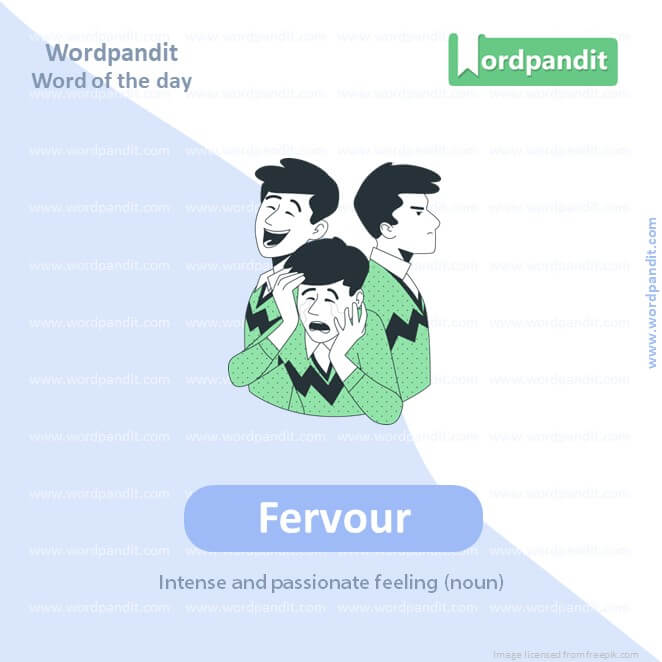
WORD-1: FERVOUR
CONTEXT: But that fervour seems to have been missing for Bitcoin in particular and crypto in general during 2023.
SOURCE: Live Mint
EXPLANATORY PARAGRAPH: Imagine you’re at your favorite birthday party, and you’re so excited that you can’t stop smiling, laughing, and jumping around. That strong feeling of excitement and happiness is called “fervour.” It’s when you feel really strongly about something and show it with lots of energy.
MEANING: Intense and passionate feeling (noun)
PRONUNCIATION: FUR-vur
SYNONYMS: enthusiasm, passion, zeal, excitement, eagerness, intensity
USAGE EXAMPLES:
1. The team’s fervour was clear as they cheered loudly during the game.
2. She spoke about her new project with great fervour.
3. The crowd’s fervour increased as the band started playing.
4. His fervour for painting was evident in every brushstroke.
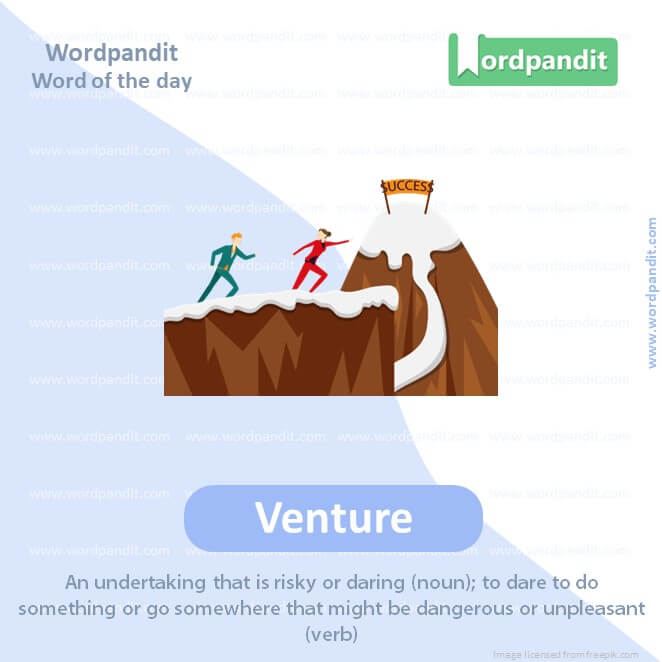
WORD-2: VENTURE
CONTEXT: So, there is no real communication happening from the industry to egg on another round of greater fools, possibly because venture capitalist money that funded the industry might be running out or the industry might be playing it safe, given the government crackdown on its unregulated nature, including in China and India.
SOURCE: Live Mint
EXPLANATORY PARAGRAPH: Imagine you and your friend decide to explore a new playground you’ve never been to before. Even though you don’t know what you’ll find, you’re excited to go on the adventure. That’s called a “venture,” where you try something new or take a risk to see what happens.
MEANING: An undertaking that is risky or daring (noun); to dare to do something or go somewhere that might be dangerous or unpleasant (verb)
PRONUNCIATION: VEN-chur
SYNONYMS: adventure, expedition, undertaking, journey, gamble, endeavor
USAGE EXAMPLES:
1. The group decided to venture into the forest to find the hidden waterfall.
2. Starting a new business is always a risky venture.
3. He ventured out in the storm despite the warnings.
4. They were excited to venture into new territory during their trip.
WORD-3: UNIPOLAR
CONTEXT: Others focused on the changing nature of globalization, the shift from a unipolar to a multipolar economic order, and the erosion of democratic institutions amid the rise of populist nationalism.
SOURCE: Live Mint
EXPLANATORY PARAGRAPH: Imagine a world where there’s only one big, important city that everyone looks up to. That’s kind of what “unipolar” means—when there is only one main or powerful thing in charge or one strong focus.
MEANING: Dominated by or having a single pole or center of power (adjective).
PRONUNCIATION: yoo-nee-POH-lur
SYNONYMS: singular, centralized, dominant, monopolistic, one-sided, focused
USAGE EXAMPLES:
1. The world became more unipolar after the fall of one of the superpowers.
2. Some argue that a unipolar world is less stable than a multipolar one.
3. In a unipolar system, one country often leads in global decisions.
4. The unipolar nature of the market means fewer competitors.
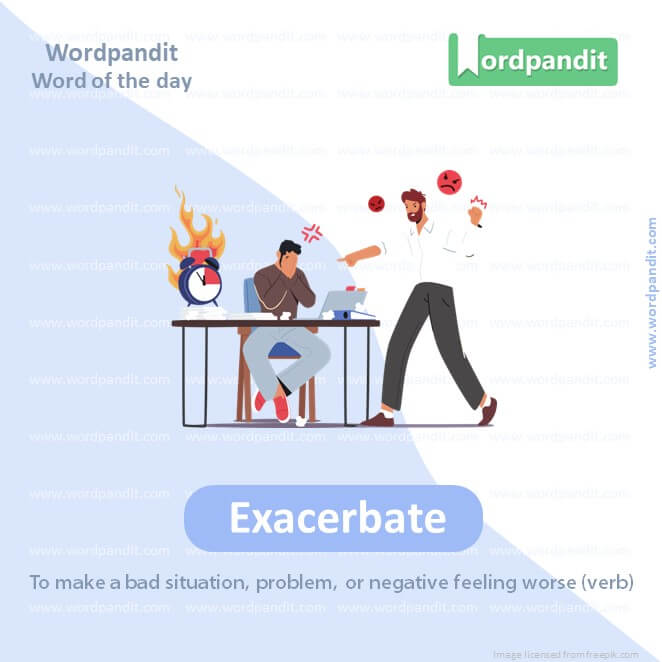
WORD-4: EXACERBATE
CONTEXT: Disillusioned Western voters’ tendency to favour right-wing leaders is puzzling, however, given that these politicians’ favoured policies will likely exacerbate the problems they purport to address.
SOURCE: Live Mint
EXPLANATORY PARAGRAPH: Imagine you have a small scratch, and instead of leaving it alone, you keep picking at it, making it worse. That’s what “exacerbate” means—when you make a problem or situation even worse than it was before.
MEANING: To make a bad situation, problem, or negative feeling worse (verb)
PRONUNCIATION: ig-ZAS-ur-bayt
SYNONYMS: worsen, aggravate, intensify, heighten, magnify, complicate
USAGE EXAMPLES:
1. His comments only served to exacerbate the argument.
2. The lack of sleep exacerbated her headache.
3. Pollution can exacerbate breathing problems in people with asthma.
4. Ignoring the issue will likely exacerbate the situation.
WORD-5: GRANULAR
CONTEXT: A more granular analysis yields a bleaker picture of the world’s economic landscape.
SOURCE: Live Mint
EXPLANATORY PARAGRAPH: Imagine a pile of sand made up of tiny little pieces. When you can see and feel those tiny pieces, you say it’s “granular.” It means something is made up of small, detailed parts, like grains of sand.
MEANING: Composed of small, distinct particles or details (adjective).
PRONUNCIATION: GRAN-yoo-lur
SYNONYMS: detailed, particulate, gritty, fine, precise, particulate
USAGE EXAMPLES:
1. The scientist studied the granular details of the rock’s texture.
2. The report provided a granular analysis of the data.
3. The sugar felt granular between her fingers.
4. They focused on the granular aspects of the project to ensure accuracy.
WORD-6: BLEAKER
CONTEXT: A more granular analysis yields a bleaker picture of the world’s economic landscape.
SOURCE: Live Mint
EXPLANATORY PARAGRAPH: Imagine a day where the sky is gray, there’s no sun, and everything feels a little sad and hopeless. When things seem sad and have little hope, we say they are “bleaker.”
MEANING: More depressing, grim, or hopeless (adjective).
PRONUNCIATION: BLEEK-er
SYNONYMS: gloomier, darker, drearier, more depressing, grimmer, more dismal
USAGE EXAMPLES:
1. The future seemed bleaker after hearing the bad news.
2. The weather grew bleaker as the storm approached.
3. As the economy worsened, the outlook became even bleaker.
4. His mood turned bleaker with each passing day.
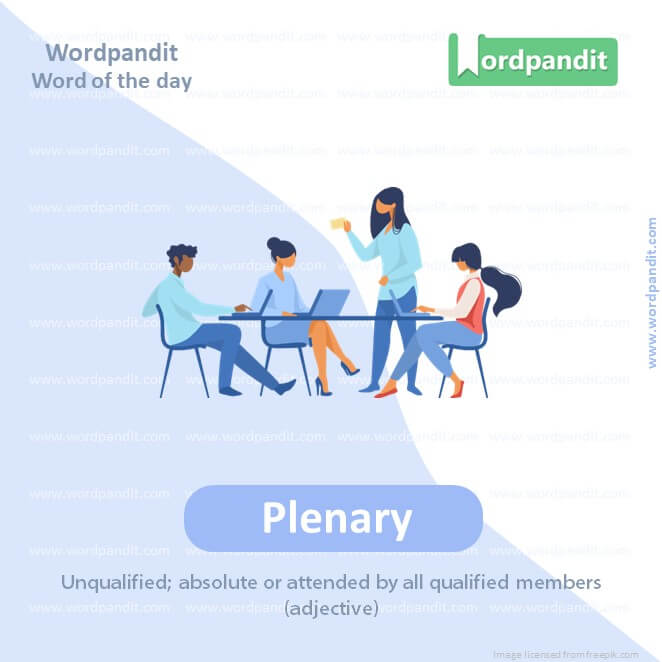
WORD-7: PLENARY
CONTEXT: On the floor of the closing plenary, many lauded this as a historic achievement since it continued to preserve the 1.5 degrees Celsius temperature target and mentioned transitioning away from fossil fuels. From a developing country’s perspective, adaptation is as crucial as mitigation.
SOURCE: Hindustan Times
EXPLANATORY PARAGRAPH: Imagine your whole class coming together for a big meeting where everyone can share ideas and make decisions together. That’s what “plenary” means—it’s when everyone gets together, and everything is included.
MEANING: Unqualified; absolute or attended by all qualified members (adjective)
PRONUNCIATION: PLEE-nuh-ree
SYNONYMS: full, complete, entire, inclusive, comprehensive, whole
USAGE EXAMPLES:
1. The plenary session brought all the delegates together.
2. The decision was made during the plenary meeting.
3. They held a plenary discussion to address everyone’s concerns.
4. The committee approved the plan in a plenary vote.
WORD-8: NUANCES
CONTEXT: While the approach in climate crisis negotiations will be country-driven, the GGA indicator framework needs to factor in nuances and disaggregate the picture of vulnerability within countries.
SOURCE: Hindustan Times
EXPLANATORY PARAGRAPH: Imagine two pictures that look almost the same, but if you look closely, one has a tiny dot that the other doesn’t. That tiny difference is called a “nuance,” a small detail that makes something slightly different or special.
MEANING: Small or subtle differences in meaning, expression, or sound (noun).
PRONUNCIATION: NOO-ahn-ses
SYNONYMS: subtleties, distinctions, variations, shades, differences, intricacies
USAGE EXAMPLES:
1. The actor’s performance captured the nuances of the character perfectly.
2. Understanding the nuances of language can help in learning new words.
3. The artist paid attention to the nuances of color in the painting.
4. The debate focused on the nuances of the policy rather than its overall impact.
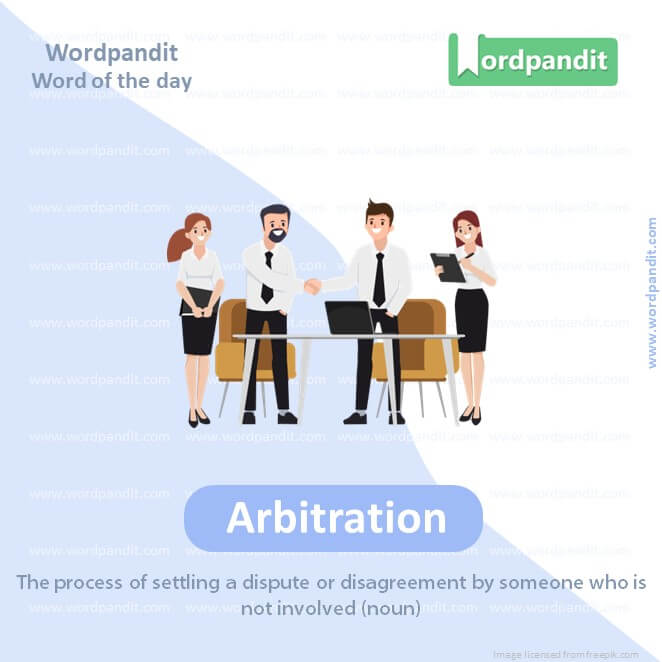
WORD-9: ARBITRATION
CONTEXT: Both SC judgments on arbitration law are landmark and authoritative with clarificatory declarations in the arbitration jurisprudence of India.
SOURCE: Hindustan Times
EXPLANATORY PARAGRAPH: Imagine two kids are arguing over who gets the last piece of candy, and a teacher steps in to help them decide fairly. That process of helping two sides agree is called “arbitration.”
MEANING: The process of settling a dispute or disagreement by someone who is not involved (noun)
PRONUNCIATION: ar-bih-TRAY-shun
SYNONYMS: mediation, negotiation, settlement, adjudication, conciliation, resolution
USAGE EXAMPLES:
1. The dispute between the companies was resolved through arbitration.
2. They agreed to go to arbitration instead of going to court.
3. Arbitration helped settle the disagreement quickly.
4. The contract required arbitration for any disputes.
WORD-10: LACKADAISICAL
CONTEXT: They can be treated as inputs but no conclusive evidence, the Supreme Court said adding that there is no ground to claim that SEBI has been lackadaisical in its probe.
SOURCE: Hindustan Times
EXPLANATORY PARAGRAPH: Imagine someone who is supposed to be playing a game but is just walking around slowly, not really trying or caring. That person is being “lackadaisical,” which means they are not putting in much effort or energy.
MEANING: Lacking enthusiasm or determination; carelessly lazy (adjective).
PRONUNCIATION: lak-uh-DAY-zih-kul
SYNONYMS: lazy, indifferent, apathetic, sluggish, unenthusiastic, listless
USAGE EXAMPLES:
1. His lackadaisical attitude toward his homework worried his parents.
2. The team lost because they played in a lackadaisical manner.
3. She gave a lackadaisical response when asked about her plans.
4. The lackadaisical employee was often late to work and uninterested in tasks.
Vocabulary Daily Use Words
In the architecturally diverse world of language learning, ‘vocabulary daily use words’ act as a cornerstone. We often take these words for granted, but their significance in day-to-day communications is nothing short of monumental. Mastering these ‘vocabulary daily use words’ should be more than an ancillary task on the sideline; it should take the center stage in your language learning journey.
To begin with, approach ‘vocabulary daily use words’ with the same gusto and reverence as you would an untapped treasure chest. Go beyond the conventional realm of textbooks and explore the world of contemporary literature, newspapers, and digital content. By immersing yourself in these mediums, you’re aligning your learning with real-world language usage, thereby gaining a practical understanding of ‘vocabulary daily use words.’
Memory-enhancing tools add an extra layer of effectiveness to your learning. Flashcards, for example, are a great way to make your study sessions interactive and memory-forging. Coupled with the Leitner system, which is a principle of spacing and repetition, you can ensure better recall and understanding of ‘vocabulary daily use words.’
Furthermore, leveraging mnemonic devices aids in etching the ‘vocabulary daily use words’ into your memory. Associating common words with unique and memorable narratives in your mind enhances their recall. Regular revision and using these words in routine conversations further cement your proficiency.
The potency of immersion as a language learning strategy cannot be emphasized enough. Conversing with native speakers, if possible, provides context to ‘vocabulary daily use words’ and boosts your fluency.
In conclusion, mastering the ‘vocabulary daily use words’ is an enriching journey that requires ongoing effort, continual exposure, and hands-on practice. The strategy of learning through various mediums, using memory-enhancing techniques, leveraging mnemonic devices, and immersion can help demystify these words and enhance your overall language proficiency. So, gear up and embrace the linguistic adventure of mastering the ‘vocabulary daily use words.’











